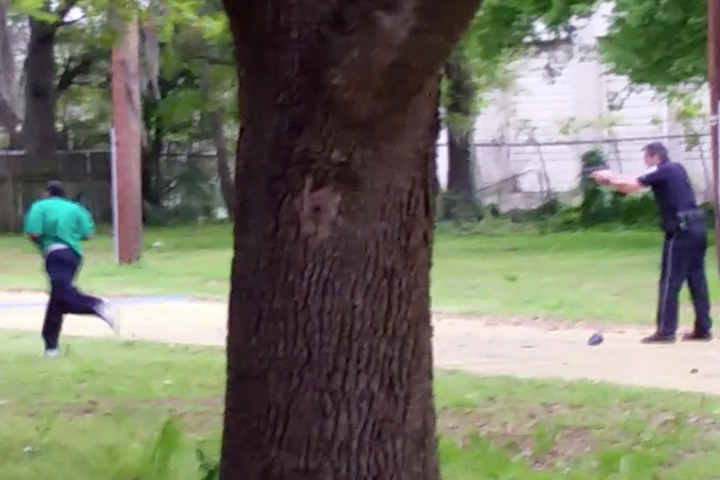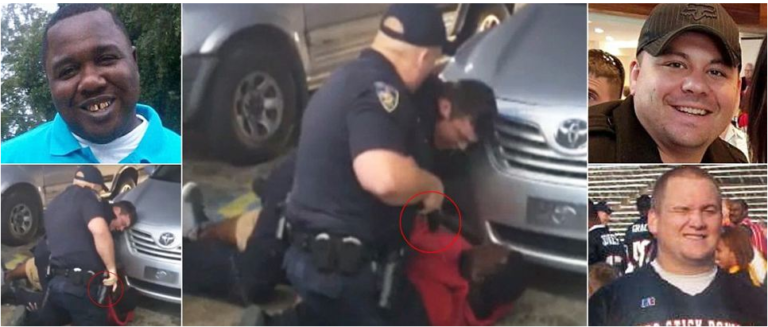One cops a plea; Two walk scot-free.
Hardly a week goes by these days without anti-Trump protesters taking to the streets. In fact, their protests so dominate public consciousness, you’d be forgiven for forgetting that anti-cop protesters were doing the same not so long ago – with the same regularity, but venting even greater outrage. “Black Lives Matter,” remember?
Frankly, there seemed to be a blaze of white cops killing black men. But anti-cop protesters often seemed more interested in fanning the flames than seeking justice. This was the context in which I commented on two high-profile cases.
I see no point in rehashing the facts involved. It’s just that, given the protest cries of “no justice, no peace,” the way the Department of Justice (DOJ) resolved these cases is instructive.
Case No. 1 Walter Scott
Here, for the record, is a little of what I wrote about this case in “Clarion Call for Body Cameras to Check Bad Cops,” April 14, 2015.
___________________
Law enforcement leaders like [NYC Commissioner Raymond] Kelly and civil rights activists like Al Sharpton are proposing a host of measures to monitor and, hopefully, control police behavior, especially when dealing with black men. Conspicuously absent from their proposals, however, is any measure that addresses the need for black men to control their behavior, especially when dealing with white cops.
By contrast, here is what I proposed — in this excerpt from “Killing of Michael Brown: as much about Resisting Arrest as Police Brutality (only against Black Men?),” August 12, 2014.
_________
Not every fatal shooting by the police of an unarmed man is a case of police brutality. We’ve all seen far too many incidents of people resisting arrest – even wresting away a policeman’s gun and killing him – just because they fear being questioned or arrested … even for something as simple as petty theft.
Indeed, you’d be hard-pressed to cite a case that resulted in fatality, where the victim followed the few general rules we should all follow when dealing with the police. Those rules, which form the acronym “Dodge” (as in bullets), are:
- Do not run.
- Obey commands. (Wait for the police to explain why you’re being stopped before politely posing any objections, concerns, or questions you may have.)
- Do not resist being frisked or handcuffed.
- Get the encounter on video. (Wait for the police to approach and make clear that you’d like to reach for your phone; i.e., avoid any sudden move that might make some trigger-happy cop’s day.)
- End the encounter civilly. (Not only might this spare another black man a racial-profiling stop (e.g., for DWB), it might make that cop less trigger happy during his next encounter with the next black man.)
This is why, even though the cops who beat the crap out of Rodney King deserved to be prosecuted, (most of) that beating would have been avoided if King were not drugged out of his mind and, therefore, unable to follow simple police instructions. …
It’s worth noting the direct correlation between police officers either wearing video cameras or videotaping every stop on dash cam and the dramatic decline not only in complaints by civilians, but also in use of force by the police. Frankly, it seems a no-brainer that every police department should make wearing body cameras as standard as wearing bulletproof vests. …
[Not to mention that] there would be fewer of these fatal encounters between black men and white cops if more (unemployed) black men became cops to police their own communities.
________
I hope law enforcement leaders and civil rights activists take heed. But, more than them, I hope black men do. After all, it’s arguable that, in every one of these cases, if the black suspect had not resisted arrest, he would not have been shot, let alone killed. So, please, let’s be wary of making martyrs of them. …
In the meantime, though, nothing makes the case for cameras as proposed quite like North Charleston prosecutors charging Michael Slager (the cop who killed Walter Scott) with first-degree murder as soon as a bystander’s video of his shooting went viral.
____________________
Sure enough:
More than two years after a North Charleston, S.C., police officer fired eight rounds to the back of a fleeing and unarmed black motorist whose burst of gunfire was recorded on video, the officer stood in a federal courtroom on Tuesday to plead guilty to charges that he violated the slain man’s civil rights.
The plea by the officer, Michael T. Slager, assured a rare conviction of a law enforcement official for an on-duty killing, and it left him facing the possibility of life in prison for the April 2015 shooting of Walter L. Scott.
‘The Department of Justice will hold accountable any law enforcement officer who violates the civil rights of our citizens by using excessive force,’ Attorney General Jeff Sessions said in a statement.
(New York Times, May 2, 2017)
Case No. 2 Alton Sterling
Here, for the record, is a little of what I wrote about this case in “Alton Sterling Latest Black Man Shot Dead While (or for?) Resisting Arrest,” July 7, 2016.
___________________
I’ve seen the video. And, like the infamous Eric Garner video, it shows Alton Sterling resisting lawful police commands pursuant to an arrest.
Of course, black activists will blame a trigger-happy cop without mentioning Sterling’s role in triggering his own death. And, as it was in the killing of Michael Brown, his defenders will blithely ignore the crime Sterling allegedly perpetrated, which caused someone to call the police in the first place.
But the video shows enough for me to assert that the Department of Justice (DOJ) will be hard-pressed to file charges for a clear violation of Sterling’s civil rights. …
Too many black activists always seem more interested in political grandstanding than saving lives. If this were not so, they would spend more time admonishing black men against resisting arrest, while they’re alive, than fueling riots and pleading to the DOJ, after they’re dead.
Not to mention the insult they cause to the real martyrs for civil rights by treating black men who resist arrest as such.
__________________
Sure enough:
The U.S. Justice Department has decided not to charge two white Baton Rouge police officers in the death of a black man whose fatal shooting was captured on cellphone video, fueling protests in Louisiana’s capital and beyond, The Associated Press has learned.
Federal authorities opened a civil rights investigation immediately after the July 2016 police shooting that killed 37-year-old Alton Sterling outside a convenience store where he was selling homemade CDs.
(Associated Press, May 2, 2017)
Notwithstanding the resolution of the Walter Scott case, many might think the resolution of this case reflects the racist bent of the Trump DOJ. But I urge them to bear this in mind:
Many of those screaming bloody murder in this case are the same, self-appointed black avengers who screamed bloody murder in the Michael Brown case. It took black Attorney General Eric Holder to finally declare that their outrage – complete with unhinged looting and vandalism – was utterly baseless [i.e., when he announced that the Obama DOJ decided not to file civil rights charges against the white cop in that infamous case].
I truly believe ‘Black Lives Matter.’ That’s why I’m more interested in preventing these black tragedies [by urging black men to stop resisting arrest] than in rushing to execute the White cops involved in them.
(“Black Lives Matter? Sandra Bland Is an Example, Not a Martyr,” The iPINIONS Journal, July 23, 2015)
That said, juxtaposing the violent protests that gave rise to these federal cases with the judicial whimper that resolved them speaks volumes. Particularly instructive in this respect is that cable news stations provided nary a mention of these resolutions. After all, they provided 24/7 coverage of those protests; never mind that they did so more as a ratings boon than public service.
I shall end by reiterating my “golden rule.” Because black men would survive 99 percent of these encounters if they just obey police commands. Unfortunately, far too many choose instead to resist arrest—pursuant to some misguided (black) badge of courage. When a policeman is placing you under arrest (no matter how unwarranted you might think that is), it should not take him (and others) wrestling you to the ground to get you into handcuffs.
Mind you, I readily concede that, in one percent of these encounters, obeying commands would not guarantee survival. The viral video of the killing of Philando Castile demonstrated this … in black and white. But this is the exception, not the rule. Which is why it’s plainly foolhardy to resist arrest because obeying commands only offers a 99 percent chance of survival.

